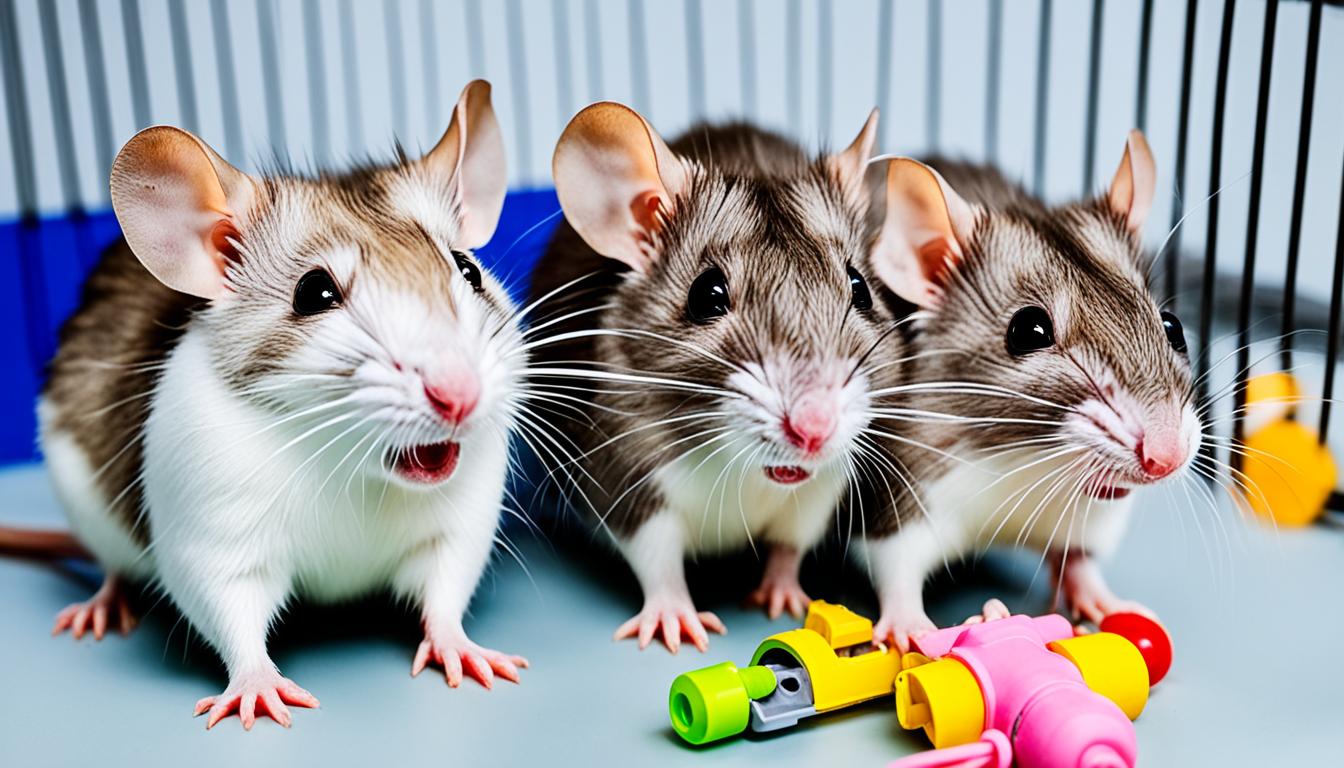Were you aware that neutering male rats can greatly improve their overall health and well-being?
Neutering rats is a procedure that involves removing the testes in male rats, rendering them sterile. Not only does this prevent unwanted mating and reduce aggression, but it also eliminates the risk of testicular tumors. Male rats that are housed with female cage-mates or exhibit aggression issues can greatly benefit from neutering. Additionally, neutering decreases the development of urethral plugs and reduces the secretion of fluids from the accessory sex glands, preventing urinary blockages and infections.
Neutering male rats is considered a safe and less traumatic procedure compared to spaying female rats. In this comprehensive guide, we will explore the benefits of neutering, the preparation required, the procedure itself, and the post-surgery care to ensure a healthier and happier pet rodent.
Key Takeaways:
- Neutering male rats provides several health and behavioral benefits, including preventing unwanted mating, reducing aggression, and eliminating the risk of testicular tumors.
- Proper assessment and preparation, including evaluation of the rat’s health and body weight, are crucial before the neutering surgery.
- The neutering procedure, also known as orchiectomy or castration, involves removing the testicles through an incision in the scrotal sac.
- Post-surgery care should involve monitoring the rat’s recovery, providing pain medication as prescribed, and ensuring a quiet and warm environment.
- Neutering male rats can also be considered for behavior issues, although individual responses may vary.
Benefits of Neutering Rats
Neutering male rats offers several benefits for their health and behavior. When considering the advantages of neutering, it is important to remember that this procedure is primarily performed to ensure the well-being of your furry friend. Let’s explore the numerous benefits of neutering male rats:
- Prevention of Unwanted Mating: Neutering your male rat is crucial if he is living with female cage-mates. By removing the testes, the risk of unintended pregnancies is eliminated, allowing you to enjoy a peaceful and controlled rat community.
- Reduction in Aggression: Neutering has shown to significantly decrease aggressive behaviors in male rats. It helps to calm their territorial instincts, making them more sociable and less prone to aggressive outbursts.
- Elimination of Testicular Tumors: By removing the testes, the likelihood of testicular tumors developing in your male rat is greatly diminished. This proactive approach ensures a healthier and longer life for your beloved pet.
Neutering male rats also brings about additional health advantages. Let’s take a closer look:
- Prevention of Urethral Plugs: Neutering decreases the development of urethral plugs, which can disrupt urination and lead to painful urinary blockages and infections.
- Reduction in Accessory Sex Gland Secretion: The procedure also lowers the secretion of fluids from the accessory sex glands, which helps prevent the buildup of smegma and keeps the glans moisturized.
Overall, neutering male rats is considered a safe and less invasive procedure when compared to spaying female rats. It provides significant health benefits, promotes harmony among cage-mates, and reduces the risk of testicular tumors. By opting for neutering, you are prioritizing the well-being of your pet rat.
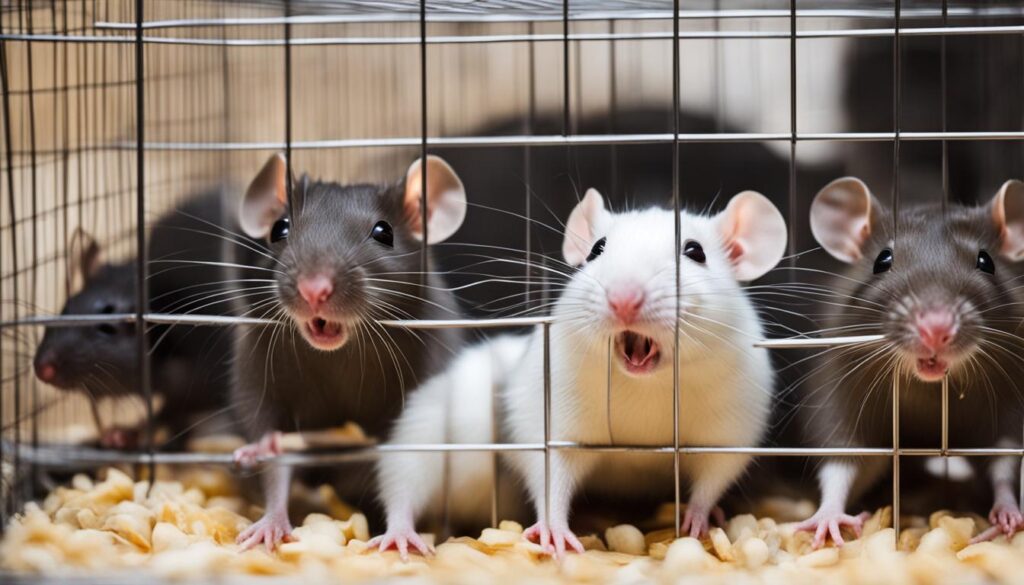
Neutering: Contributing to a Healthy and Happy Life
“Neutering male rats is not only beneficial for their health, but it also promotes a positive environment for the entire rat community. By eliminating the risks of unintended pregnancies and curbing aggressive behaviors, neutering allows rats to thrive socially and ensures their well-being. Make the decision to neuter your male rat and contribute to a healthier, happier life together.”
| Advantages of Neutering Male Rats | |
|---|---|
| Prevention of Unwanted Mating | ✓ |
| Reduction in Aggression | ✓ |
| Elimination of Testicular Tumors | ✓ |
| Prevention of Urethral Plugs | ✓ |
| Reduction in Accessory Sex Gland Secretion | ✓ |
Preparing for Neutering Surgery
Before proceeding with the neutering surgery, it is crucial to ensure that the male rat is properly assessed and prepared for the procedure. This includes evaluating its overall health, particularly with regard to respiratory diseases and heart conditions. If the rat has a respiratory disease, surgery may still be possible if symptoms are mild, and antibiotics can be prescribed to prevent relapse.
While a baseline minimal screening for the rat’s health is advisable, it may not always be necessary depending on the age and health history of the rat. It is important to work closely with a qualified veterinarian who can provide guidance based on the individual rat’s needs.
Fasting is not required for rats before surgery since they cannot vomit. However, it is essential to bring the rat to the veterinary clinic in a small carrier where it can be easily observed. To ensure the rat’s comfort during its stay, provide non-ravel cloth for bedding, a filled water bottle, and its regular food and treats.
An accurate measurement of the rat’s body weight is necessary for the correct dosing of anesthetics and analgesics during the surgery. This emphasizes the importance of obtaining an accurate weight measurement before proceeding with the neutering procedure.
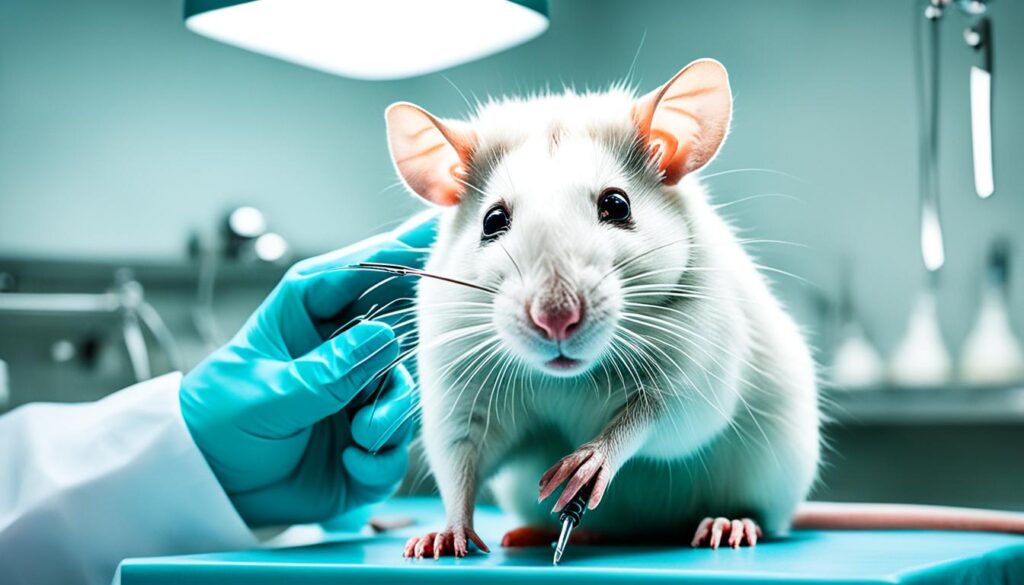 <!–
<!–Heading
Content
Quote
- Item
- Item
| Header | Header |
|---|---|
| Data | Data |
Neutering Procedure for Male Rats
The neutering procedure for male rats, also known as orchiectomy or castration, is an essential veterinary surgery performed to render the male rat sterile and eliminate unwanted behaviors such as aggression and mating attempts. This procedure involves making an incision in the scrotal sac and removing the testicles. Unlike spaying female rats, neutering male rats is considered less invasive and generally safe when performed by experienced veterinary surgeons.
During the neutering procedure, the veterinary surgeon carefully removes the testicles, ensuring minimal discomfort for the rat. This surgery aims to prevent the production of sperm and reduce the secretion of hormones associated with mating behavior. While the primary goal is sterilization, neutering also helps decrease aggression, making male rats more sociable and easier to handle.
It is important to note that the neutering procedure for male rats is not only beneficial for behavioral reasons but also plays a significant role in preventing testicular tumors. By removing the testicles, the risk of developing these tumors is effectively eliminated, ensuring the long-term health and well-being of the male rat.
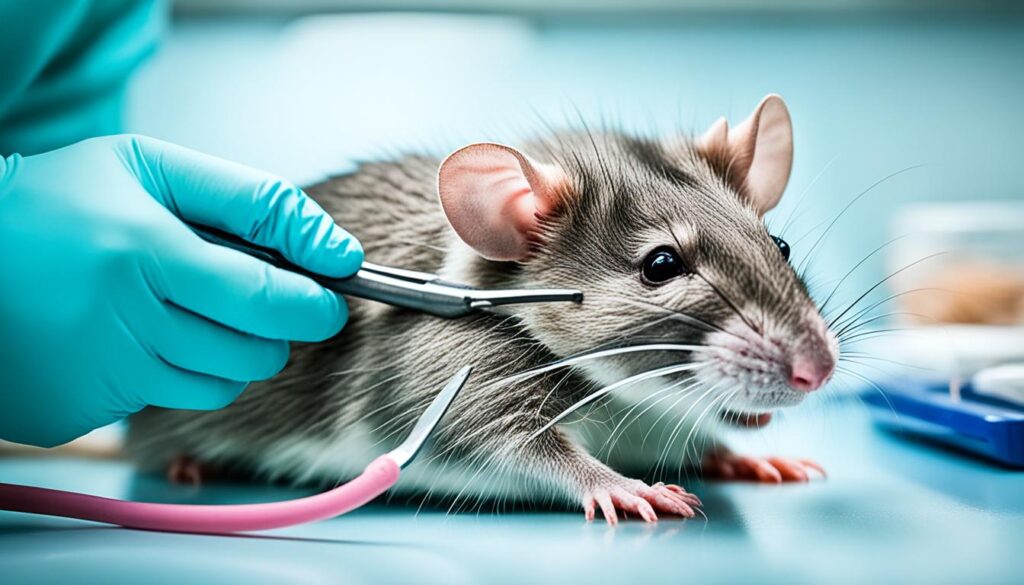
The recovery period after neutering is typically smooth, and rats usually resume normal activities within a few days. However, it may take up to three weeks for the male rat to become infertile, and behavioral changes, such as a decrease in aggression and urine marking, may take six to eight weeks to become noticeable.
Neutering male rats is a responsible choice for pet owners. It not only prevents unwanted litters but also reduces the risk of testicular tumors and improves the overall behavior of the rat. If you’re considering neutering your male rat, consult with an experienced veterinarian to ensure a safe and successful procedure.
Recovery and Care After Neutering
After the neutering surgery, we need to ensure proper recovery and post-surgery care for male rats. This critical period requires monitoring and attention to promote healing and overall well-being.
Here are some important steps to consider:
- Providing a suitable environment: Keep the male rat in a quiet and warm area with access to clean bedding, fresh water, and regular food. Remember, a calm and stress-free environment is essential for a smooth recovery.
- Administering pain medication: Follow the veterinarian’s instructions and give the prescribed pain medication as directed. This will help manage any discomfort associated with the surgery.
- Isolating the rat: It’s recommended to isolate the rat for the first 24 hours post-surgery to minimize any potential disturbances. This isolation will allow the rat to rest and recover without interference from cage-mates.
- Providing high-caloric foods: During recovery, male rats may require extra nutrition to aid in their metabolic processes. Offer high-caloric foods to prevent hypoglycemia and support the healing process. Check with your veterinarian for suitable options.
- Monitoring the incision site: Regularly inspect the incision site for any signs of abnormality. Look for oozing, swelling, excessive redness, or any other concerning changes. If you notice anything unusual, contact your veterinarian for guidance.
- Observing normal bodily functions: Within 24 hours, the rat should resume normal eating, drinking, urination, and defecation. These are positive signs of a successful recovery. However, if you notice any prolonged abnormalities or concerns, seek immediate veterinary attention.
Remember, each rat’s recovery can vary, so it’s important to provide individualized care and attention. By following these guidelines and promptly addressing any concerns, you can ensure a smooth post-neutering recovery for your male rat.
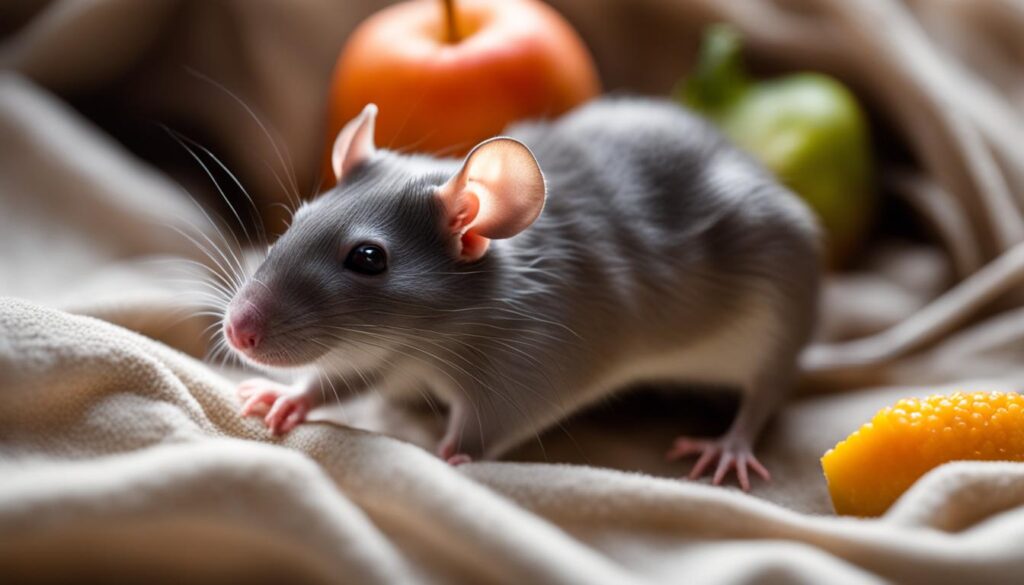
Considering Neutering for Behavior Issues
Neutering male rats can be an effective solution for addressing behavior issues such as aggression and excessive urine marking. While neutering may not completely eliminate these behaviors, it can significantly reduce their frequency and intensity, making it easier to manage your rat’s behavior and create a more harmonious environment.
When it comes to reducing aggression in male rats, neutering can play a key role. The procedure helps to regulate hormone levels and temper aggressive tendencies, making rats calmer and more amicable. Combining neutering with behavior modification techniques, such as proper socialization and positive reinforcement training, can further enhance the effectiveness of behavioral improvements.
It is important to note that each rat is unique and may respond differently to neutering. Some rats may exhibit noticeable changes in behavior shortly after the procedure, while others may take several weeks for the effects to become apparent. It is always recommended to consult with a veterinarian experienced in working with rats to discuss the best course of action for your pet.
Neutering male rats not only helps with behavior issues but also offers numerous health benefits. By eliminating the risk of testicular tumors and reducing the likelihood of urinary blockages, neutering can significantly improve the overall well-being and longevity of your furry friend.
“Neutering male rats can help reduce aggression and excessive urine marking, making them more amicable and easier to manage.”
Take a look at the table below for a summary of the impact of neutering on behavior issues in male rats:
| Behavior Issue | Effect of Neutering |
|---|---|
| Aggression | Significantly reduces frequency and intensity |
| Excessive Urine Marking | Reduces marking behavior |
| Mounting/Mating Attempts | Decreases or eliminates mating behavior |
Neutering male rats is a proactive step toward promoting a healthier and more well-adjusted pet. It’s important to consider the benefits and potential effects on behavior when making decisions regarding neutering. Remember to consult with a veterinarian who has experience working with rats to ensure the best outcome for your furry companion.
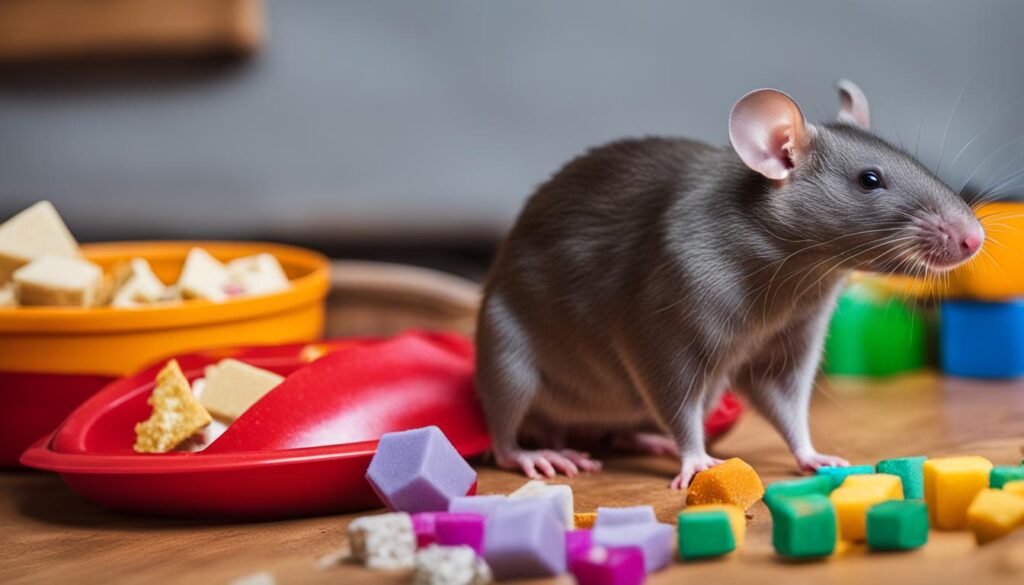
Conclusion
Neutering male rats is a beneficial procedure that offers multiple advantages for their health and behavior. It helps prevent unwanted mating, reduces aggression, and eliminates the risk of testicular tumors. Compared to spaying female rats, neutering is relatively safe, less traumatic, and associated with lower morbidity and mortality rates. However, proper assessment and preparation before the surgery, as well as postoperative care, are crucial for the rat’s well-being and recovery.
Neutering male rats can also be considered for behavior issues, such as aggression and excessive urine marking. While it may not completely eliminate these behaviors, neutering can significantly reduce their frequency and intensity, especially when combined with appropriate behavior modification techniques. It is important to consult with a veterinarian experienced in rat care to make informed decisions regarding neutering.
In summary, neutering male rats is a beneficial procedure that has both health and behavioral advantages. It is a relatively safe and less traumatic option compared to spaying female rats. By preventing unwanted mating, reducing aggression, and eliminating the risk of testicular tumors, neutering can contribute to a happier and healthier life for pet rats. Remember to consult with a knowledgeable veterinarian to ensure the best care for your furry friend.
